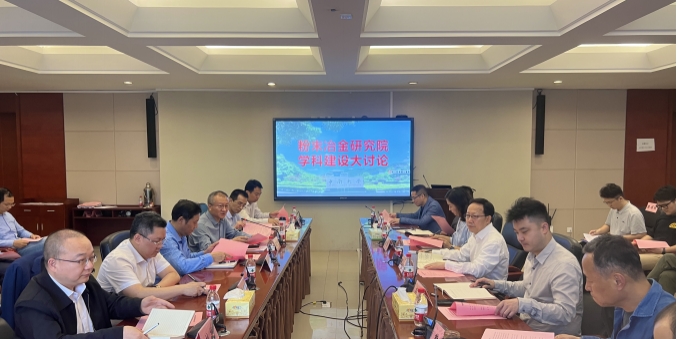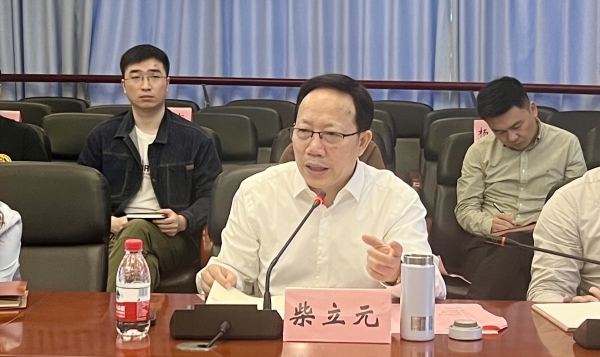On April 17, the Powder Metallurgy Research Institute held a major discussion on discipline construction. Faculty and student representatives exchanged ideas on solidly advancing discipline construction and promoting high-quality, connotative development. Academician of the Chinese Academy of Engineering, member of the Party Committee, and Vice President of Central South University, Chai Liyuan, attended the meeting to provide guidance, accompanied by personnel from the University’s Development Planning and Discipline Construction Office. The discussion was chaired by Wang Dezhi, Party Secretary of the Powder Metallurgy Research Institute, and was attended by the institute’s leadership, representatives from the Professor Committee, department heads, young faculty, and student representatives. Dean Zhang Dou presided over the meeting.

During the meeting, Dean Zhang Dou introduced the institute’s ongoing efforts in conducting an in-depth discussion on discipline construction and outlined the objectives of the meeting. Faculty and student representatives, drawing on their own experiences in teaching, research, and study, engaged in discussions around three main topics: enhancing the effectiveness of discipline construction funding, implementing the “One Discipline, One Policy” action plan, and leveraging external resources to promote growth.

Vice President Chai Liyuan highly praised the significant achievements made in discipline construction at the institute in recent years. He also offered five key requirements and expectations for the institute’s future development based on its current situation and the discussion:
One, balance strategic planning with tactical implementation. Strategic planning should consider the discipline from a broader perspective, uniting the institute’s strengths to form a collective force and focusing on cultivating world-class disciplines. Tactical implementation requires the institute to organize various tasks systematically, including team building.
Two, balance inheritance with development. The institute should inherit the spirit and culture of the previous generation, shape the discipline’s core values, create new recognition for the discipline, strengthen talent development, and strive for national-level collective and individual honors.
Three, balance connotative development with high-visibility indicators. The institute should refine its focus on areas of strength, guide faculty to strengthen basic research, produce more innovative theoretical results, and enhance the international reputation of the discipline.
Four, balance the transformation of results with major, symbolic achievements. The institute should transform high-level scientific research into new productive forces that drive industry and enterprise development, establish joint efforts with companies, and foster the collaborative development of industry, academia, and research. Additionally, the goal should be to cultivate national-level awards and significant achievements.
Five, balance team building with the evaluation mechanism. The institute should optimize its evaluation system, leveraging evaluations as a tool to highlight team performance, refine representative academic achievements, and ensure that awards applications are tied to research results and performance assessments. Internal team management should be optimized to make the best use of the different talents within the team, and efforts should be made to recruit non-staff researchers to boost team productivity.
On behalf of the institute, Dean Zhang Dou expressed gratitude to the university for its long-term support and guidance in the development of the Materials Science and Engineering discipline. He stated that this major discussion has provided a clear direction and pathway for the future development of the discipline. The institute will actively explore new methods and paths based on the outcomes of this discussion, rally the efforts of all faculty and students, and jointly promote the high-quality development of the Materials Science and Engineering discipline.
